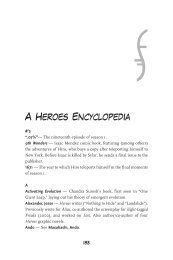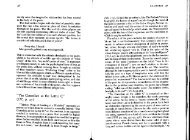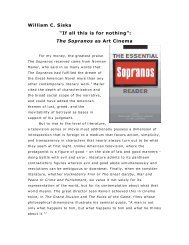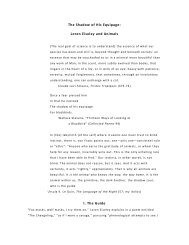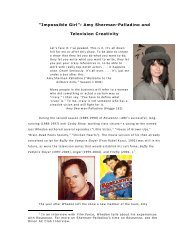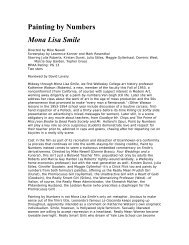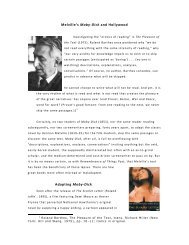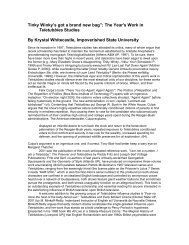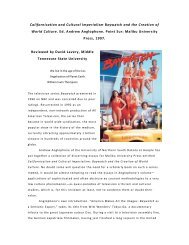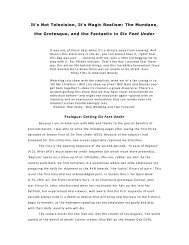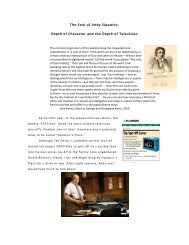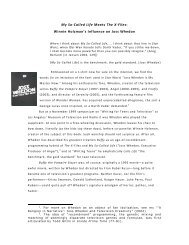Bruce Plourde Tony and Dora: Mastering the Art of ... - David Lavery
Bruce Plourde Tony and Dora: Mastering the Art of ... - David Lavery
Bruce Plourde Tony and Dora: Mastering the Art of ... - David Lavery
You also want an ePaper? Increase the reach of your titles
YUMPU automatically turns print PDFs into web optimized ePapers that Google loves.
<strong>Bruce</strong> <strong>Plourde</strong><br />
<strong>Tony</strong> <strong>and</strong> <strong>Dora</strong>: <strong>Mastering</strong> <strong>the</strong> <strong>Art</strong> <strong>of</strong> Counter-<br />
Transference<br />
Good Dr. Melfi, quite late in her<br />
association with Anthony Soprano,<br />
decides that this mobster patient <strong>of</strong> hers<br />
is more trouble than he’s worth. Not only<br />
is <strong>Tony</strong> avoiding a sincere examination <strong>of</strong><br />
his morality, but he is actively<br />
manipulating <strong>the</strong> <strong>the</strong>rapeutic exercise to<br />
make himself a better criminal. While <strong>the</strong><br />
persevering doctor continues to have<br />
hopes <strong>of</strong> accomplishing some fundamental<br />
change in <strong>the</strong> pathology <strong>of</strong> her star<br />
patient, she tolerates his lies, his<br />
excuses, <strong>and</strong> his rationalizations. Up to a<br />
point, she can overlook his failings because he delivers occasional<br />
glimpses <strong>of</strong> <strong>the</strong> exciting life he lives outside <strong>the</strong> <strong>of</strong>fice. While most<br />
patients drone on about <strong>the</strong>ir dull <strong>and</strong> petty problems, <strong>Tony</strong> mingles<br />
normal “family” concerns with hints <strong>of</strong> sex, crime, <strong>and</strong> underworld<br />
intrigue. During those several years <strong>of</strong> treatment, she gradually<br />
deduces that <strong>Tony</strong> is using her guidance for dishonest ends, <strong>and</strong> she<br />
periodically questions herself about this dilemma. And after she thus<br />
searches her soul, she resolutely does nothing about it. Only when she<br />
sees herself through her colleague’s eyes, <strong>and</strong> feels <strong>the</strong><br />
embarrassment <strong>of</strong> <strong>the</strong>ir gaze, does she opt to cut him loose. Publicly<br />
exposed before a jury <strong>of</strong> her peers as a mobster’s <strong>the</strong>rapist, she<br />
recognizes with horror that she appears an accomplice to his<br />
criminality. Judging herself as critically as she believes her circle <strong>of</strong><br />
friends is doing, she finally produces an act <strong>of</strong> self-preservation that<br />
she could not have accomplished earlier, when <strong>the</strong> seduction <strong>of</strong><br />
treating a crime boss trumped her o<strong>the</strong>r concerns.
It is that very seduction which has always played significantly<br />
into <strong>the</strong> <strong>the</strong>rapeutic setting, <strong>and</strong> in more ways than one. Freud claims<br />
as much, <strong>and</strong> documents two kinds <strong>of</strong> seduction, in <strong>the</strong> case study <strong>of</strong><br />
one <strong>of</strong> his patients he published in 1905. In this study, Freud does not<br />
use <strong>the</strong> word “seduction,” simply because he would not verbalize <strong>the</strong><br />
doctor-patient relationship in those terms. Instead, he uses <strong>the</strong> word<br />
“transference,” which he describes as <strong>the</strong> process whereby <strong>the</strong> patient<br />
projects feelings or ideas onto <strong>the</strong> <strong>the</strong>rapist. By acting as a kind <strong>of</strong><br />
accepting surrogate, <strong>the</strong> <strong>the</strong>rapist can “seduce” <strong>the</strong> patient into<br />
expressing freely <strong>the</strong> passions, fears, <strong>and</strong> o<strong>the</strong>r psychic energies<br />
contained within his or her interior space. Such a playing out <strong>of</strong><br />
emotions can lead to a remedy <strong>of</strong> <strong>the</strong> patient’s psychoses, but it can<br />
also become problematic, especially if <strong>the</strong> patient misinterprets <strong>the</strong><br />
<strong>the</strong>rapist’s supportive posture, <strong>and</strong> blames <strong>the</strong> <strong>the</strong>rapist for those<br />
vented emotions. As Freud declares, “Transference, which seems<br />
ordained to be <strong>the</strong> greatest obstacle to psychoanalysis, becomes its<br />
most powerful ally, if its presence can be detected each time <strong>and</strong><br />
explained to <strong>the</strong> patient” (108). Accordingly, <strong>the</strong>n, a <strong>the</strong>rapist can<br />
seduce a patient into disclosure, as long as s/he <strong>the</strong>n defuses <strong>the</strong><br />
building emotions by making clear why <strong>the</strong> patient is feeling as s/he<br />
does.<br />
The good Viennese doctor amplifies this explanation <strong>of</strong><br />
transference in <strong>the</strong> case study <strong>of</strong> <strong>the</strong> young <strong>and</strong> attractive <strong>Dora</strong>,<br />
imparting to his audience <strong>the</strong> details <strong>of</strong> how he had unlocked <strong>the</strong><br />
secrets <strong>of</strong> her psyche from a mere two sessions. Allowing her to play<br />
out her inner state before him, he diagnoses her main issue as<br />
repressed sexuality, resulting in hysterical, bodily responses. Reading<br />
her symptoms <strong>and</strong> her verbalized narrative, Freud deduces that she<br />
desires sex, not only with her fa<strong>the</strong>r’s partner, but with her fa<strong>the</strong>r,<br />
too, as well as with <strong>the</strong> governess who works for her fa<strong>the</strong>r’s partner.<br />
She projects her sexual desire onto seemingly everyone around her,<br />
regardless <strong>of</strong> gender or stature. In his assessment, Freud even<br />
perceives that this virginal, bi-sexual nymphomaniac feels lust for him.<br />
Clinically, he states with pr<strong>of</strong>essional confidence that “<strong>the</strong> idea had
probably occurred to her one day during a sitting that she would like to<br />
have a kiss from me” (66). In o<strong>the</strong>r words, through transference, this<br />
attractive teenager has decided to direct at <strong>the</strong> grizzled, middle-aged<br />
cigar smoker all <strong>of</strong> <strong>the</strong> sexual desires smoldering within her young<br />
body.<br />
What Freud seems only to be partly aware <strong>of</strong>, <strong>and</strong> what Dr. Melfi<br />
also seems to dismiss, is that transference works both ways. Even a<br />
well-educated clinician has an underlying human interest, <strong>and</strong> a<br />
capacity to project thoughts <strong>and</strong> desires onto o<strong>the</strong>rs. Such “counter-<br />
transference” can bypass <strong>the</strong> carefully constructed boundaries erected<br />
by <strong>the</strong> best <strong>of</strong> <strong>the</strong>rapists, <strong>and</strong> create feelings <strong>and</strong> sympathies which<br />
arise from <strong>the</strong> <strong>the</strong>rapist’s own interior life. Unwittingly, Freud has<br />
documented this second kind <strong>of</strong> seduction in <strong>the</strong> “<strong>Dora</strong>” case study.<br />
Does Freud really think that <strong>the</strong> youthful <strong>Dora</strong> wants her two-time<br />
<strong>the</strong>rapist to kiss her, or is he projecting his own desire onto this girl?<br />
And does Melfi really think that she can help <strong>Tony</strong>, or does she persist<br />
in working with him because she finds him so attractive?<br />
The attraction that Dr. Melfi feels for <strong>Tony</strong> is as enticing as <strong>the</strong><br />
attraction which Freud feels for his <strong>Dora</strong>. Freud plays out his fantasy<br />
through his <strong>the</strong>rapeutic narrative, just as Melfi has her own moments<br />
<strong>of</strong> erotic supposition. But it is not just sexual appeal which makes<br />
<strong>the</strong>se patients so alluring to <strong>the</strong>ir <strong>the</strong>rapists. Both pr<strong>of</strong>essionals in<br />
<strong>the</strong>ir fields, <strong>the</strong>y also enjoy a pr<strong>of</strong>essional challenge. Curing <strong>Dora</strong> <strong>of</strong><br />
her hysteria would help to validate Freud’s groundbreaking work in<br />
psychiatry, <strong>and</strong> suggest that, even if he could never know what women<br />
want, he could claim masterly insight into feminine psychology. For<br />
Melfi, <strong>the</strong> challenge lies in leading a Mafioso toward a renunciation <strong>of</strong><br />
his immoral <strong>and</strong> pathological character. Should she find a way to<br />
convince <strong>the</strong> mobster that his life is in need <strong>of</strong> rehabilitation, she could<br />
validate her pr<strong>of</strong>essional life, her talent as a <strong>the</strong>rapist, <strong>and</strong> her very<br />
soul. That affirmation remains an imaginable possibility that stays ever<br />
just out <strong>of</strong> reach for her. <strong>Tony</strong> can be explosive <strong>and</strong> threatening, but at<br />
o<strong>the</strong>r times he can be docile <strong>and</strong> weepy; he tells stories <strong>of</strong> violence<br />
<strong>and</strong> crime, but he also expresses genuine love for his “family” family.
In some ways, he is so close to <strong>the</strong> kind <strong>of</strong> man who could lead a<br />
normal life – he is so close to <strong>the</strong> “dreamy” Kevin Finnerty – that Melfi<br />
is convinced substantive change is possible. As Dr. Margaret<br />
Crastnopol declares <strong>of</strong> such situations,<br />
There might be instances where somebody's psychopathy could<br />
be unlocked <strong>and</strong> undone. And so <strong>the</strong> temptation <strong>of</strong> <strong>the</strong> analyst to<br />
try to make that happen . . . could be <strong>the</strong>re <strong>and</strong> still have it be a<br />
worthy temptation” (Branswell).<br />
This temptation is part <strong>of</strong> Melfi’s self-serving attraction to <strong>Tony</strong>. But,<br />
as Branswell also notes, <strong>the</strong>rapists who recognize <strong>the</strong>ir human<br />
engagement with patients should be wary <strong>of</strong> allowing <strong>the</strong>ir pr<strong>of</strong>essional<br />
ambition <strong>and</strong> <strong>the</strong>ir ego to influence <strong>the</strong>ir prognoses.<br />
Melfi <strong>and</strong> Freud both rationalize <strong>the</strong>ir interactions with <strong>the</strong>ir<br />
patients as mere pr<strong>of</strong>essional interest. Melfi, however, experiences a<br />
moment <strong>of</strong> humiliation, which forces her to confront a truth she has for<br />
so long resisted. Attending a dinner party with a group <strong>of</strong> fellow<br />
psychiatrists, one <strong>of</strong> <strong>the</strong> women present innocently mentions a study<br />
she had recently read. She explains that what caught her attention<br />
about this study, accredited to Samenow <strong>and</strong> Yochelson, was <strong>the</strong><br />
revelation that <strong>the</strong>rapy is ineffective in altering <strong>the</strong> sociopathology <strong>of</strong><br />
criminals. In fact, <strong>the</strong> opposite is <strong>the</strong> case: <strong>the</strong>rapy gives <strong>the</strong>m tools to<br />
make <strong>the</strong>m more articulate in <strong>the</strong>ir deceptions. Melfi, upon hearing this<br />
summary, feels inept, discovering that apparently all <strong>of</strong> her colleagues<br />
but she is familiar with this study, so pertinent to her own career. The<br />
public mention <strong>of</strong> this study is doubly damning since her confidante<br />
<strong>and</strong> <strong>the</strong>rapist, Eliot Kupferberg, had mentioned <strong>the</strong> study to her in an<br />
earlier session, indicating that her continued work with patient<br />
Soprano serves no real purpose. After feelings <strong>of</strong> incompetence comes<br />
anger, as she assumes that Kupferberg has told <strong>the</strong> o<strong>the</strong>rs about her<br />
situation, <strong>and</strong> that, in talking about this study, <strong>the</strong>y are talking about<br />
her. In a sense, <strong>the</strong>y are talking about her, especially after Kupferberg<br />
outs her in a drunken moment as Soprano’s <strong>the</strong>rapist. When <strong>the</strong><br />
specter <strong>of</strong> condemnation arises through <strong>the</strong> guise <strong>of</strong> <strong>the</strong> Samenow <strong>and</strong>
Yochelson article, <strong>and</strong> she feels <strong>the</strong> unspoken criticism <strong>of</strong> her peers,<br />
Melfi can no longer ignore her willful blindness.<br />
Freud is more successful in his self-delusion. Sitting with <strong>Dora</strong><br />
for <strong>the</strong>ir two sessions, he can persist in denying his own erotic feelings<br />
for this girl, even while he realizes that he is writing a study that, by<br />
its very nature, contains something <strong>of</strong> <strong>the</strong> salacious in it. In fact, he<br />
observes, as a kind <strong>of</strong> warning, that o<strong>the</strong>r unscrupulous <strong>the</strong>rapists<br />
might read his case study <strong>of</strong> a young, sexually starved girl “for <strong>the</strong>ir<br />
private delectation” (Freud 3). Not him, <strong>of</strong> course, because he is ever<br />
a pr<strong>of</strong>essional. But some <strong>of</strong> his brethren in <strong>the</strong> field would surely read<br />
his study as a kind <strong>of</strong> pornography. In point <strong>of</strong> fact, it does read as<br />
such in places, since <strong>the</strong> details Freud chooses to include read like a<br />
graphic coming-<strong>of</strong>-age novel. For example, Freud asks a direct<br />
question, <strong>and</strong> records <strong>Dora</strong>’s confession that she masturbates<br />
regularly. On fur<strong>the</strong>r probing, she also admits to a factual knowledge<br />
<strong>of</strong> her fa<strong>the</strong>r’s ongoing affair with his business partner’s wife, <strong>and</strong> she<br />
concedes that she enjoys <strong>the</strong> friendly affection she receives from older<br />
men. Throughout <strong>the</strong> text, in fact, <strong>the</strong>re are many lewd <strong>and</strong> suggestive<br />
details which would (in 1905) make for ra<strong>the</strong>r prurient reading, <strong>and</strong><br />
certainly reading unlike <strong>the</strong> typical case study. If he does manage to<br />
couch his reading <strong>of</strong> <strong>the</strong> feminine psyche in clinical terms, Freud finally<br />
cannot exorcise what lingers in <strong>the</strong> narrative, which is his own<br />
attraction to <strong>Dora</strong>, an attraction he attempts to disguise by<br />
transferring it to those disreputable <strong>the</strong>rapists who would find <strong>the</strong><br />
study titillating.<br />
Just as Freud imagined, those prurient readers are also members<br />
in good st<strong>and</strong>ing <strong>of</strong> <strong>the</strong> APA. In The Sopranos, Eliot Kupferberg<br />
represents <strong>the</strong> kind <strong>of</strong> <strong>the</strong>rapist who serves his own private delectation<br />
through <strong>the</strong> <strong>the</strong>rapeutic situation. At first, he is one <strong>of</strong> <strong>the</strong> people who<br />
warns Melfi about <strong>the</strong> dangers <strong>of</strong> treating a psychopath, <strong>and</strong> who<br />
questions her motives for doing so. He suggests that she is living<br />
vicariously through her patient’s narrative, taking part in <strong>the</strong> world <strong>of</strong><br />
mob violence <strong>and</strong> intrigue from <strong>the</strong> safe haven <strong>of</strong> <strong>the</strong> doctor’s <strong>of</strong>fice.<br />
But <strong>the</strong>rapists can be like Tireisias, <strong>the</strong> prophet who could so clearly
“see” <strong>the</strong> situation <strong>of</strong> Oedipus while remaining blind to his own<br />
condition. After a time, <strong>the</strong> warnings from Kupferberg dissipate, <strong>and</strong><br />
Melfi’s <strong>the</strong>rapist begins to express concern for her in terms <strong>of</strong> how she<br />
is dealing with her mobster connection. In one scene, while still<br />
dealing with <strong>the</strong> trauma <strong>of</strong> rape, Jennifer bares her soul to her<br />
<strong>the</strong>rapist. Listening to her express her highly charged anxiety, Eliot<br />
delivers <strong>the</strong> st<strong>and</strong>ard assurance <strong>and</strong> consolation before asking, “And<br />
patient Soprano? How’s all that? (“He is Risen,” 3.8). Not long after<br />
this moment, when he compassionately introduces mention <strong>of</strong> subject<br />
Soprano as a factor in her mental state, he drops all pretence <strong>and</strong><br />
begins to ask outright what <strong>Tony</strong> has been up to lately. Melfi picks up<br />
on <strong>the</strong> change right away, <strong>and</strong> seems to accept that, in some ways,<br />
even her own <strong>the</strong>rapist would be more interested in <strong>the</strong> mobster’s life<br />
than in her own, ra<strong>the</strong>r conventional one. Later attempts to phrase his<br />
curiosity as concern do not deceive Melfi, as in later sessions she<br />
refers to Soprano as Kupferberg’s favorite patient.<br />
Melfi: As your favorite patient says, maybe I should put my shoe<br />
up her ass.<br />
Kupferberg: Which patient <strong>of</strong> mine says that?<br />
Melfi: Mine, Eliot. Your favorite patient <strong>of</strong> mine.<br />
Kupferberg: Oh. [Reaching for his water bottle]. He hasn’t been<br />
in <strong>the</strong> paper much lately.<br />
Melfi: You miss that, don’t you?<br />
Kupferberg: My fa<strong>the</strong>r was a rabid Untouchables fan. Make <strong>of</strong><br />
that what you will.<br />
(“Stage Five,” 6.II.2)<br />
The long swig from <strong>the</strong> water bottle serves to deflect<br />
momentarily his patient’s observation, but it also serves to confirm his<br />
oral fixation, satisfied as much by <strong>the</strong> flow <strong>of</strong> water as by <strong>the</strong> flow <strong>of</strong><br />
<strong>the</strong> spoken narrative that includes mobster elements. Ra<strong>the</strong>r than<br />
answer her charge directly, he rationalizes his interest as a product <strong>of</strong><br />
his fa<strong>the</strong>r’s habits, not his own. He cannot admit to a friend <strong>and</strong><br />
colleague, <strong>and</strong> much less a patient, that her comment bears any truth<br />
value. At home, however, with no collegial pressures or judgments, he
trades <strong>the</strong> water bottle for a wine glass, <strong>and</strong> gives full vent to his<br />
fixation with mobster culture. Watching Geraldo Rivera’s update about<br />
<strong>the</strong> possible successors to <strong>the</strong> imprisoned Johnny Sacrimoni,<br />
Kupferberg declares, “This Santoro thing, I called it a year ago”<br />
(“Stage Five,” 6.II.2). He feels, yet publicly masks, <strong>the</strong> same<br />
intellectual curiosity in <strong>the</strong> gritty underworld that most anyone, even<br />
ano<strong>the</strong>r <strong>the</strong>rapist, might experience.<br />
His curiosity – <strong>and</strong> so his humanity – does not make him a bad<br />
person or a bad <strong>the</strong>rapist. It makes him normal: <strong>the</strong> rule, not <strong>the</strong><br />
exception. Therapists <strong>of</strong> all stripe, like everyone, are sometimes able<br />
to blind <strong>the</strong>mselves to objective reality, even when <strong>the</strong> evidence lies<br />
right before <strong>the</strong>m. That blindness preserves <strong>the</strong> integrity <strong>of</strong> <strong>the</strong>ir egos<br />
by allowing <strong>the</strong>m to affirm <strong>the</strong>ir service to <strong>the</strong> public good. Kupferberg<br />
can rectify for himself <strong>the</strong> conflicting aims <strong>of</strong> an interest in <strong>the</strong> mob<br />
<strong>and</strong> his concern for <strong>the</strong> well-being <strong>of</strong> Melfi. Remaining largely<br />
unexamined, his interests are not in apparent conflict. In <strong>the</strong> <strong>Dora</strong><br />
case, too, Freud can label his patient as a frustrated, uncontrollably<br />
hysterical young girl with bi-sexual tendencies. At <strong>the</strong> same time, <strong>and</strong><br />
with no apparent awareness <strong>of</strong> inconsistency, he can describe her as<br />
talented, gifted, <strong>and</strong> self-aware. She has an “intellectual precocity”<br />
(Freud 13) arising from her natural intelligence <strong>and</strong> good education.<br />
Also, as a young Viennese woman who keeps current with <strong>the</strong> world<br />
around her, she acknowledges a familiarity with Freud’s work. As he<br />
reports, “She had already done some training in dream interpretation<br />
from having analyzed a few minor specimens” (56). She underst<strong>and</strong>s<br />
much, <strong>and</strong> exhibits a degree <strong>of</strong> control through that underst<strong>and</strong>ing, a<br />
fact which Freud recognizes but dismisses. Blinding himself to his own<br />
inconsistencies, Freud cannot see that <strong>Dora</strong> has made a fool <strong>of</strong> him by<br />
manipulating <strong>the</strong> very tools <strong>of</strong> his own pr<strong>of</strong>ession, feeding him false<br />
information, <strong>and</strong> underst<strong>and</strong>ing what he might make <strong>of</strong> it.<br />
Much <strong>of</strong> <strong>the</strong> substance <strong>of</strong> <strong>the</strong> <strong>Dora</strong> study involves <strong>the</strong><br />
interpretation <strong>of</strong> two dreams. In <strong>the</strong> case <strong>of</strong> <strong>the</strong> first dream, her<br />
recitation <strong>of</strong> <strong>the</strong> details sounds sincere <strong>and</strong> honest, if brief. Her entire<br />
re-telling consists <strong>of</strong> five short sentences, leaving ample room for
Freud to fill in <strong>the</strong> gaps with interpretation. In those lacunae, he<br />
perceives that <strong>the</strong> young girl masturbates to excess, <strong>and</strong> that she<br />
wants to have sex with her fa<strong>the</strong>r. Her response to his comments, as<br />
Freud tells us, is <strong>of</strong>ten “I knew you would say that” (54). At several<br />
points in his assessment, which he shares with <strong>Dora</strong>, she claims to<br />
have anticipated him. Later, during <strong>the</strong>ir second <strong>and</strong> final session, her<br />
narrative does not seem as unrehearsed as <strong>the</strong> first one. <strong>Dora</strong> relates<br />
<strong>the</strong> details <strong>of</strong> her second dream, rich in symbols <strong>and</strong> details that she<br />
assumes Freud will pick up on <strong>and</strong> interpret in a suggestively symbolic<br />
way. A letter, a train station, <strong>the</strong> woods – <strong>Dora</strong> includes several<br />
elements in which <strong>the</strong> author <strong>of</strong> The Interpretation <strong>of</strong> Dreams (1900)<br />
would surely be compelled to find meaning. As Freud asks for<br />
clarifications while she relates <strong>the</strong> dream story, she interjects fur<strong>the</strong>r,<br />
explanatory details, guiding him toward <strong>the</strong> reading <strong>of</strong> her narrative<br />
she hopes he will create. If she anticipates him during her telling <strong>of</strong><br />
<strong>the</strong> first dream, she leads him down <strong>the</strong> royal road <strong>of</strong> deception in <strong>the</strong><br />
description <strong>of</strong> <strong>the</strong> second dream. Then, after toying with him, she<br />
leaves, never to return. She has, for all practical purposes, ridiculed<br />
his methods <strong>and</strong> himself, but Freud never admits to this conclusion,<br />
interpreting her disappearance as fear <strong>of</strong> <strong>the</strong> truth.<br />
<strong>Tony</strong> is playing out <strong>the</strong> <strong>Dora</strong> scenario through a longer time<br />
period. He learns a great deal about psychology over <strong>the</strong> years <strong>of</strong><br />
sessions with Melfi, <strong>and</strong> admits as much to her in one <strong>of</strong> <strong>the</strong>ir sessions.<br />
Between <strong>the</strong> two feminine presences in his life (namely, Carmela <strong>and</strong><br />
Melfi), he can piece toge<strong>the</strong>r a better awareness <strong>of</strong> <strong>the</strong> issues which<br />
might impact his career. For example, he perceives, <strong>and</strong> interprets<br />
correctly, <strong>the</strong> latent hostility Christopher expresses for <strong>the</strong> boss in his<br />
film Cleaver. Thinly veiled as <strong>Tony</strong>, <strong>the</strong> mob boss <strong>of</strong> <strong>the</strong> film commits<br />
<strong>the</strong> egregious act <strong>of</strong> seducing <strong>the</strong> fiancée <strong>of</strong> a capo, <strong>and</strong> goes on,<br />
before film’s end, to catch <strong>the</strong> avenging blade <strong>of</strong> a cleaver with his<br />
forehead. Melfi plays devil’s advocate, suggesting that <strong>the</strong> movie might<br />
not be <strong>the</strong> wish fulfillment <strong>Tony</strong> makes it out to be.<br />
Melfi: Without invalidating your feelings, is it possible that on<br />
some level you’re reading into all this?
<strong>Tony</strong>: I’ve been coming here for years. I know too much about<br />
<strong>the</strong> subconscious now.<br />
(“Stage Five,” 6.II.2)<br />
Like <strong>Dora</strong>, he has learned enough about <strong>the</strong> rules <strong>of</strong> Melfi’s game to<br />
read with confidence <strong>the</strong> hidden impulses <strong>of</strong> his associates, which<br />
proves an asset in his life’s work.<br />
<strong>Dora</strong> is interested merely in playing a joke on Freud, a possibility<br />
that Freud himself admits to more than once: contemptuous <strong>of</strong> <strong>the</strong><br />
authority <strong>of</strong> doctors, she may simply be “taking revenge” upon him, he<br />
writes. <strong>Tony</strong>, however, learns that he can sidestep his <strong>the</strong>rapist’s<br />
probity while taking something <strong>of</strong> value from her work with him. Early<br />
on, he applies <strong>the</strong> new ideas she shares with him – for example,<br />
allowing a man like Uncle Junior to think he is in charge – to improve<br />
his business situation. Manipulating <strong>the</strong> rules <strong>of</strong> <strong>the</strong> psychology game,<br />
he delivers what half-truths he must reveal to Melfi, while taking her<br />
sincere gestures <strong>of</strong> psychological insight as instruction for stabilizing<br />
his position as <strong>the</strong> don <strong>of</strong> North Jersey. He finesses <strong>the</strong>rapy, like every<br />
o<strong>the</strong>r venture he is involved with, to create an opportunity for<br />
maximized return. For <strong>the</strong> opportunistic <strong>Tony</strong>, <strong>the</strong>re is no o<strong>the</strong>r way to<br />
see human interaction but as a chance to gain an advantage.<br />
Melfi: You can’t control everything that happens.<br />
<strong>Tony</strong>: But you can get pissed <strong>of</strong>f.<br />
Melfi: And <strong>the</strong>n what? Lose control?<br />
<strong>Tony</strong>: Who said anything about that? You direct your anger<br />
where it belongs.<br />
Melfi: You have panic attacks. Panic occurs when feelings <strong>of</strong><br />
anger, revenge, whatever overwhelm you. That’s where<br />
behavioral <strong>the</strong>rapy comes in. It can teach you to control those<br />
trigger points.<br />
<strong>Tony</strong>: Then how do you get people to do what you want?<br />
(“Employee <strong>of</strong> <strong>the</strong> Month,” 3.4)<br />
Getting people to do what he wants is how <strong>Tony</strong> achieves ascendancy<br />
in every potentially beneficial situation, including psychiatry.
Only after Melfi gets her wake-up call from her colleagues does<br />
she read him – <strong>and</strong> herself – most critically. In <strong>the</strong> session with <strong>Tony</strong><br />
following her public humiliation, he begins to tell a story about his<br />
son, whose suicide attempt is costing him a fortune in private hospital<br />
bills. That story, for <strong>the</strong> now aware <strong>and</strong> watchful Dr. Melfi, soon turns<br />
into a clear example <strong>of</strong> <strong>the</strong> deceit <strong>and</strong> manipulation practiced by <strong>the</strong><br />
criminals who inhabit <strong>the</strong> Samenow <strong>and</strong> Yochelson article. When he<br />
resorts to <strong>the</strong> old pose <strong>of</strong> <strong>the</strong> concerned fa<strong>the</strong>r who would do anything<br />
to prevent <strong>the</strong> suffering <strong>of</strong> <strong>the</strong> children, <strong>and</strong> <strong>the</strong> crocodile tears make<br />
<strong>the</strong>ir appearance, Melfi has had enough. She is on to him, <strong>and</strong> she is<br />
tired <strong>of</strong> pretending. <strong>Dora</strong> ab<strong>and</strong>ons Freud after her second session,<br />
allowing him to continue to believe in his own genius. <strong>Tony</strong>, however,<br />
stays with Melfi long enough that she realizes <strong>the</strong> extent to which this<br />
man, whose luxurious life is built on <strong>the</strong> broken backs <strong>of</strong> o<strong>the</strong>rs, has<br />
been playing her. In <strong>the</strong>ir final session, she reviews <strong>the</strong> substance <strong>of</strong><br />
<strong>the</strong>ir previous years <strong>of</strong> <strong>the</strong>rapy, consolidating his fabrications into <strong>the</strong>ir<br />
essence. In anticipating him, she bluntly reveals something that she<br />
has long withheld: that she knows <strong>the</strong> rules <strong>of</strong> his game as well.<br />
<strong>Tony</strong>: He’s really hurting, AJ.<br />
Melfi: And you?<br />
<strong>Tony</strong>: Well, you know, maybe, you know … you know what?<br />
Forget his hurts. Maybe I should have just …<br />
Melfi: Put a shoe up his ass?<br />
<strong>Tony</strong>: Yeah. Yeah, frankly. Ahh, we’ve talked about this.<br />
Melfi: And talked about it.<br />
<strong>Tony</strong>: Huh? Anyway, Carmela …<br />
Melfi: Mollycoddled him.<br />
<strong>Tony</strong>: My old man …<br />
Melfi: Are you a shining example for <strong>the</strong> huge collection <strong>of</strong><br />
wingtips <strong>and</strong> loafers that must be lodged up your lower bowel?<br />
<strong>Tony</strong>: What’s <strong>the</strong> matter with you? Is it because I said that about<br />
being divorced?<br />
Melfi: You were saying? …<br />
(“The Blue Comet,” 6.II.8)
As <strong>the</strong> discussion continues, Melfi is moved to avenge her anger by<br />
doing to <strong>Tony</strong> something he had done repeatedly to her over <strong>the</strong> years.<br />
Frustrated with herself, she projects that frustration onto <strong>Tony</strong>, <strong>and</strong><br />
<strong>the</strong>n immaturely criticizes him for her own crass behavior.<br />
<strong>Tony</strong>: What’s with <strong>the</strong> tone? You sound like you’re glad I’m<br />
taking it on <strong>the</strong> chin.<br />
Melfi: Maybe you’re projecting hostile feelings.<br />
<strong>Tony</strong>: Bullshit. If we had instant replay, you’d see it in two<br />
seconds.<br />
Melfi: Well, we don’t have instant replay.<br />
<strong>Tony</strong>: I know that. Jesus Christ, you sound like my fuckin’ wife.<br />
Melfi: Your fucking wife?<br />
<strong>Tony</strong>: You know what I mean…<br />
Melfi: I don’t think I can help you.<br />
(“The Blue Comet,” 6.II.8)<br />
Over <strong>the</strong> years, both <strong>Tony</strong> <strong>and</strong> Melfi have threatened to end <strong>the</strong>ir<br />
relationship, but this exchange makes explicit <strong>the</strong> fact that Melfi is<br />
sincerely done. The Dr. Melfi who had long validated her patient’s<br />
feelings <strong>and</strong> indulged him in his whims has retreated into <strong>the</strong> wood<br />
work <strong>of</strong> her <strong>of</strong>fice, replaced by this woman scorned. The statue <strong>of</strong> <strong>the</strong><br />
female behind her, usually expressing Melfi’s own open <strong>and</strong> accepting<br />
posture, is likewise replaced with a female statue assuming a closed,<br />
aggressive pose. With this angel on her shoulder, <strong>the</strong> doctor puts an<br />
end to <strong>the</strong>ir association with a brutal coldness that stuns even <strong>Tony</strong>,<br />
who, without any sense <strong>of</strong> irony, criticizes her for being “immoral.”<br />
If <strong>Tony</strong> is hypocritical, he is also right. Melfi, by processing <strong>and</strong><br />
acting upon <strong>the</strong> emotions all people are prone to, finally takes pleasure<br />
in violating <strong>the</strong> social compact she has previously gone to pains to<br />
uphold. If she were to rationalize her actions, as <strong>Tony</strong> makes a<br />
practice <strong>of</strong> doing, she might claim her act one <strong>of</strong> just desserts. This<br />
action takes <strong>the</strong> shape <strong>of</strong> violating <strong>the</strong> trust <strong>of</strong> her patient, an act <strong>of</strong><br />
poetic justice because it betrays <strong>the</strong> betrayer. Melfi exults in finally<br />
acting out <strong>the</strong> same selfishness <strong>and</strong> egotism she has watched Soprano<br />
exhibit for years. Despite <strong>the</strong> barriers <strong>and</strong> boundaries established by
pr<strong>of</strong>essionals to prevent <strong>the</strong>ir loss <strong>of</strong> better judgment or <strong>the</strong>ir sense <strong>of</strong><br />
proportion, <strong>the</strong>y are finally people, too. As Svetlana Kirilenko put it,<br />
“People are people” (“The Strong, Silent Type,” 4.10), even <strong>the</strong>rapists.<br />
Every human relationship is, in psychological terms, a process <strong>of</strong><br />
transference <strong>and</strong> counter-transference; every human ego requires<br />
some level <strong>of</strong> self-delusion <strong>and</strong> projection. People cast <strong>the</strong>ir own<br />
desires <strong>and</strong> dreams onto those closest to <strong>the</strong>m, <strong>of</strong>ten failing to see <strong>the</strong><br />
real persons instead <strong>of</strong> <strong>the</strong> persons <strong>the</strong>y have conjured from <strong>the</strong>ir own<br />
expectations. As well trained as <strong>the</strong>rapists are in reading <strong>the</strong> human<br />
condition, <strong>the</strong>y can be misled, <strong>and</strong> <strong>the</strong>y can persist in <strong>the</strong>ir denial. In<br />
Freud’s case, he refuses to believe that <strong>Dora</strong> is manipulating him. As<br />
for Melfi, she has always known that <strong>Tony</strong> has lied to her, right from<br />
<strong>the</strong> first, when he explains a leg-breaking incident as “just having<br />
c<strong>of</strong>fee” (“The Sopranos,” 1.1). Over <strong>the</strong> years <strong>of</strong> truly trying to make<br />
him confront his most deep-seated issues, she has only been helping<br />
him find new ways to validate his worst sins. On realizing that her<br />
work for <strong>the</strong> good has been in <strong>the</strong> service <strong>of</strong> evil all along, <strong>the</strong> best<br />
remedy – for her, not for him – is swift <strong>and</strong> total closure.<br />
As Melfi goes, so goes <strong>the</strong> nation: seduction turns to repulsion.<br />
The good <strong>the</strong>rapist, who for years has embodied <strong>the</strong> audience’s own<br />
reading <strong>of</strong> this provocative figure, cannot continue to tolerate her<br />
patient’s bad behavior, <strong>and</strong> nei<strong>the</strong>r finally can we. We have (as <strong>David</strong><br />
Chase states in an interview with Brett Martin) been allowing <strong>Tony</strong> to<br />
serve as our alter ego for years, living vicariously through his<br />
adventurous immorality. Yet, as <strong>the</strong> seasons progress, <strong>and</strong> we learn<br />
more about <strong>the</strong> character <strong>of</strong> Soprano, <strong>the</strong> creator Chase clarifies with<br />
ever more vividness <strong>the</strong> pr<strong>of</strong>ound darkness <strong>of</strong> <strong>Tony</strong>’s character, <strong>the</strong><br />
selfishness <strong>and</strong> conceit which drive him, <strong>and</strong> <strong>the</strong> appalling lack <strong>of</strong><br />
humanity which insulates him. We persist in watching <strong>and</strong> wondering,<br />
until Melfi allows us to recognize more clearly <strong>the</strong> relentlessness <strong>of</strong><br />
this man’s depravity. When she finally has had enough, we discover at<br />
long last our own intolerance. Our pleasure, <strong>and</strong> our attraction, has<br />
likewise turned to disgust, not only with him, but also with ourselves<br />
for our own complicity. With that realization comes our own
embarrassment, <strong>and</strong> our subsequent ab<strong>and</strong>onment <strong>of</strong> <strong>Tony</strong>. By <strong>the</strong> end,<br />
we acknowledge Chase’s gesture to The Godfa<strong>the</strong>r’s assassination<br />
scene, <strong>and</strong> we are willing to give him up. Dr. Melfi, our reader <strong>of</strong><br />
<strong>Tony</strong>’s true self, leads <strong>the</strong> way for us, turning from him with contempt,<br />
<strong>and</strong> refusing to be a partner any longer.




